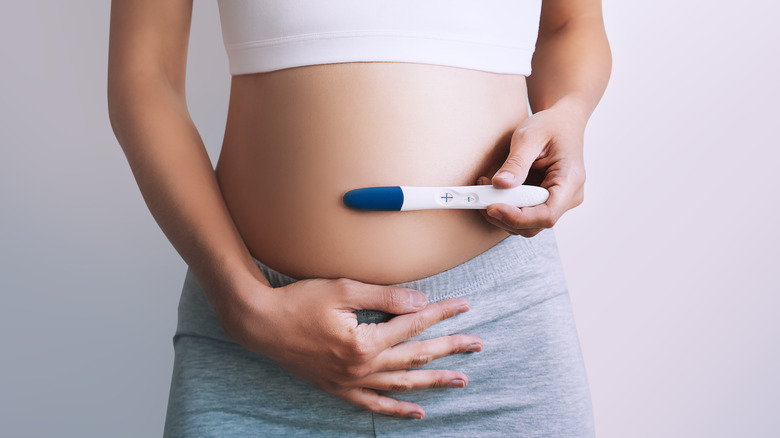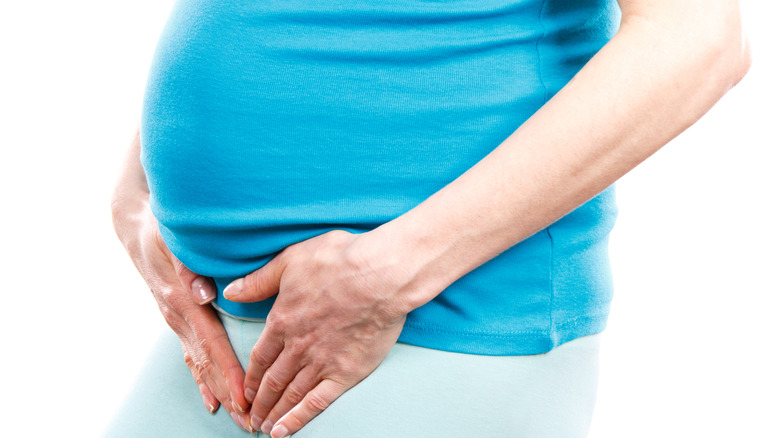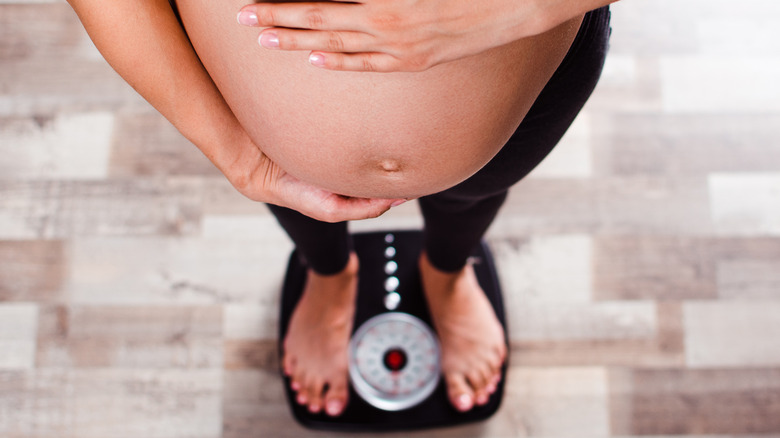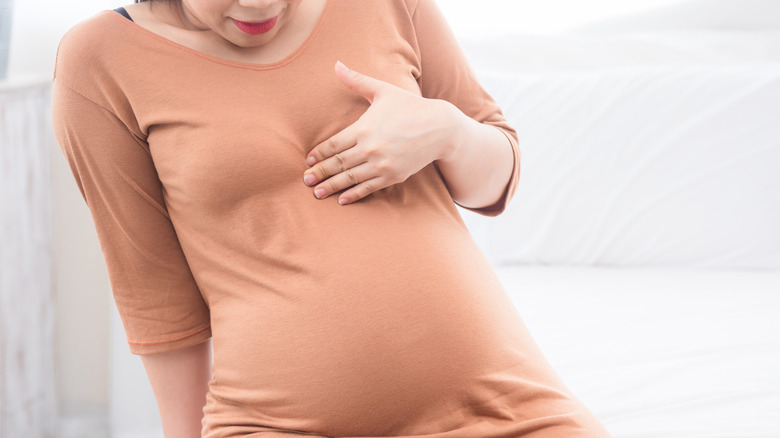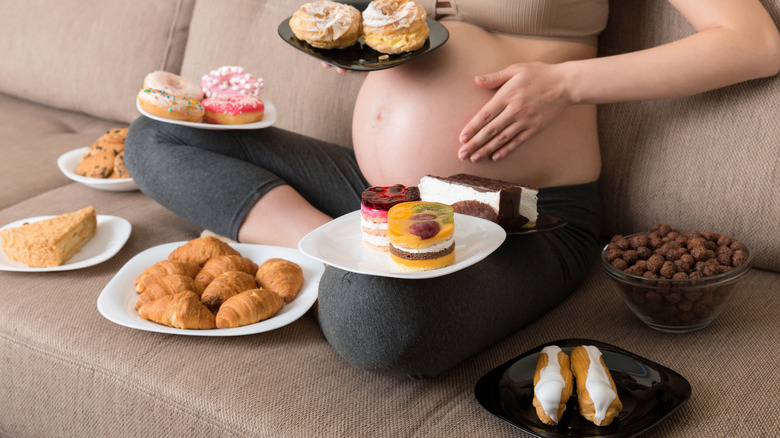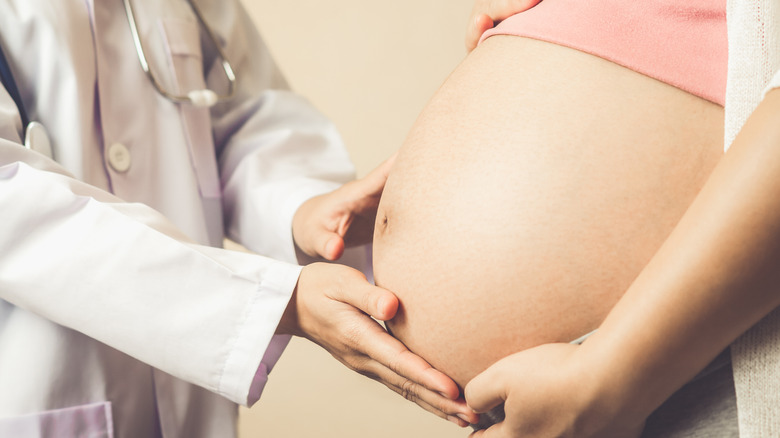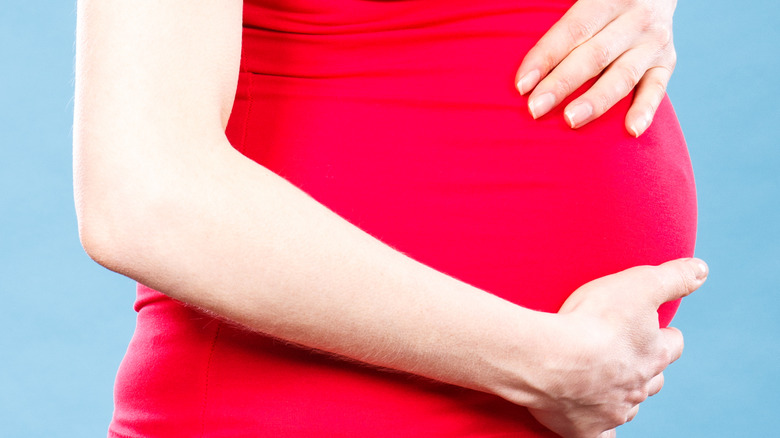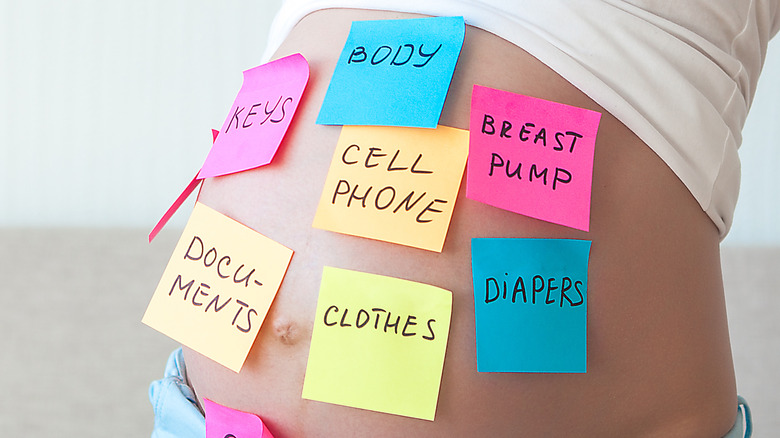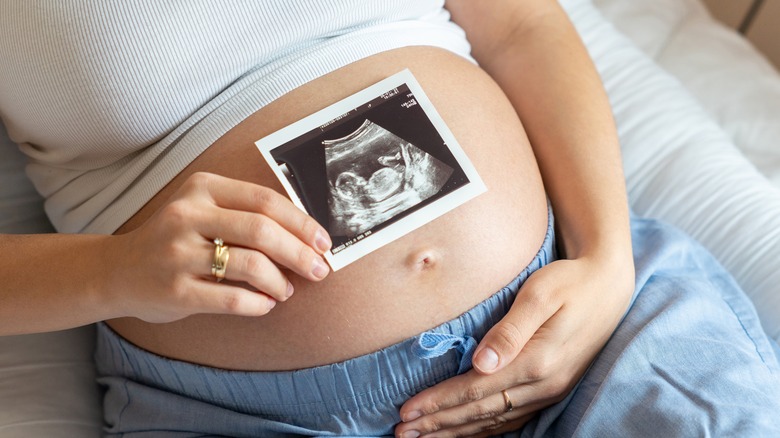What To Expect During The First Trimester Of Pregnancy
You're pregnant — congratulations! Even though you may not look pregnant yet, you're probably filled with a surge of emotions (and a lot of questions, too). While pregnancy is a unique experience and will be different for everyone, know that you're not alone, and that many women are going through the same thing as you are. Since you will be growing a human in your body for the next nine months, it should come as no surprise that your body will be going through some changes, many of which are invisible to the outside world.
What exactly is the first trimester? The first trimester of pregnancy is counted from the first day of your last period to the end of week 13, or about one to three months, according to What to Expect. If you're unsure of what week you are currently in, you can get an accurate calculation using this due date calculator.
A lot will happen during your first trimester, including common early symptoms such as morning sickness, mood swings, and breast tenderness. Sensitivity to smell and frequent urination can appear as soon as a week following conception (via What to Expect). These first few weeks and months are vital, as your body is busy making your precious baby. Here's what else you can expect during your first trimester of pregnancy.
Morning sickness
Feeling nauseous or like you want to vomit? You may have morning sickness. This usually starts around six weeks into pregnancy (via March of Dimes). Don't be fooled by its name, though, as it doesn't just happen in the morning. 7 out of 10 pregnant women have morning sickness during their first trimester. If you're one of those women, don't worry, because it usually subsides in the second trimester.
According to the Cleveland Clinic, the specific cause of morning sickness is unknown, but it's speculated to be the result of a surge in hormones or low blood sugar. It can also be amplified when you're stressed, overtired, or when you eat certain foods. If you have first-trimester nausea and want to feel better, then March of Dimes suggests keeping snacks like crackers by your bed to help settle your stomach. Eating small meals throughout the day, as well as meals that are easy to digest (such as rice and bananas), may also help you feel better, or may even prevent morning sickness.
Tender breasts
If you notice your breasts are feeling tender or getting larger, that's because they probably are. This is quite normal: It happens very early in your pregnancy and usually lasts for the duration of the first trimester (per What to Expect). This is a good thing, because these breast changes are preparing your body for your baby's arrival.
If you're wondering what is causing this tenderness or pain in your breasts, it's your hormones, says the American Pregnancy Association. Your milk ducts begin to grow as they prepare for lactation. As they begin to fill with milk early in pregnancy, they cause your breasts to become more sensitive, which can feel uncomfortable. To help make you feel more comfortable during your first trimester, the APA suggests wearing a maternity or nursing bra that doesn't have an underwire cup. They also suggest a sports bra or a sleep bra with soft cotton lining to help minimize your discomfort.
Increased urination
In addition to morning sickness and breast tenderness, you can add an increase in urination to the list of symptoms you may possibly have during your first trimester.
An increase in urination may also lead to bladder leakage for some pregnant women. A study published in the International UroGynecology Journal found that stress urinary incontinence (SUI), which is a leakage of urine, affects roughly 54% of all pregnant women. If you're wondering what causes the increase in urination and bladder leakage, the study indicated that it's due to the pressure of your growing uterus, as well as the fetal weight. Add your hormonal changes on top of that, and you may find yourself wanting to pee much more frequently.
There are several techniques you can try at home to help improve your bladder control or leakage, such as limiting the number of fluids you drink, switching to decaffeinated beverages (coffee and tea may make you want to go more often), and eating foods that are high in fiber, since constipation can be a culprit of urine leakage (via the Cleveland Clinic).
Constipation
Constipation is another uncomfortable symptom that you may experience during the first trimester. Constipation occurs when you have high levels of progesterone, which causes the food you eat to travel through your digestive tract at a slower pace (per the Mayo Clinic).
A study on treating constipation during pregnancy reports an estimated 11% to 38% percent of women experience irregular bowel movements or have difficulty with the evacuation of their bowels. The researchers suggest pregnant women may find relief in increased fiber and exercise. However, they say that doesn't always do the trick, so they also suggest stool softeners or the following types of laxatives: lubricant, osmotic, and stimulant.
If your constipation is bothering you, ask your doctor to suggest the best course of treatment for your specific symptoms. They may suggest eating more fiber or drinking extra fluids to help get things moving. If that doesn't help, they may also prescribe a stool softener or mild laxative that is safe for pregnancy.
Fatigue
If you feel like you don't have any energy to do anything anymore and your bed is always calling your name, know that this feeling of fatigue is extremely common during your first trimester. Fatigue is a signal that your body needs to operate at a slower pace to adjust to the changes that are happening in your body (via the University of Rochester Medical Center). When your progesterone level starts to rise during the first trimester, it makes your feel tired.
While having a baby growing inside you can definitely make you feel exhausted, there are a few things you can do if you want to combat pregnancy fatigue. According to Healthline, you can create an optimal sleep environment by keeping your bedroom dark and cold. This will help to ensure you reach a night of deep sleep. You can also try and keep your blood sugar and energy levels balanced by eating six small meals (that are high in protein and nutrients) daily. By doing this, as well as avoiding caffeine and exercising, you should be on your way to beating pregnancy fatigue.
Weight gain
Pregnancy weight gain is one of the most common concerns of patients during the first-trimester obstetrical visit, says OB-GYN Dr. Jamie Lipeles (via Healthline). During your first trimester, you may not even gain any weight at all, and if you do, you may only gain up to about 5 pounds at most, explains the American College of Obstetricians and Gynecologists.
While there's no one-size-fits-all approach to weight gain during pregnancy, it depends on your body mass index (BMI) before your pregnancy. Your BMI is your body fat calculated from weight and height. You can use this BMI calculator to help you determine your BMI before pregnancy, so you know how much weight you should expect to gain (per CDC).
During the first trimester, you should gain about 2 to 4 pounds and about a pound a week for the rest of the time you are pregnant (via WebMD). If you had an average weight before you were pregnant, you should expect to gain between 25 and 35 pounds throughout your pregnancy. If you think you're gaining too much weight during the first trimester, speak with your doctor to help determine the right course of action for you.
Heartburn
One of the most commonly reported complaints of women during pregnancy is heartburn (per Science Daily). Heartburn usually begins to rear its ugly head during the first trimester, then tends to get worse as the pregnancy continues. Since your body produces more of the hormone progesterone during pregnancy, it relaxes the muscles in your lower esophagus, which usually would help keep the acid down in your stomach. When this happens, you can get heartburn (via WebMD).
The best way to prevent or avoid heartburn, according to the American Pregnancy Association, is to eat small meals throughout the day, avoid spicy and greasy foods, and wait at least an hour after you eat to lie down. If you are experiencing heartburn a lot during your first trimester, then you can try a few natural ways to relieve your symptoms, such as drinking a glass of milk, eating yogurt, or eating a tablespoon of honey. If your heartburn is severe, you should contact your doctor.
Mood swings
If you feel happy one minute then on the verge of tears the next, you're not alone. Mood swings are very common during pregnancy, and tend to happen during your first trimester. Experiencing PMS prior to pregnancy means you're more likely to experience severe mood swings while you're pregnant (via Kids Health).
Mood changes during pregnancy may be caused by the hormones estrogen and progesterone, stress, fatigue, or changes in your metabolism. You should know that mood swings are a normal experience and part of your pregnancy journey (per APA). To help manage your stress level, the APA suggests you can try the following: sleep well, take time to relax, eat, get exercise, go for a walk, get a massage, and lastly, not be so hard on yourself. If your mood swings last more than two weeks, consider speaking with your health care provider about your options on how to better deal with your mood swings.
Food cravings
Ice cream and pickles and eating peanut butter straight from the jar are just some of the cravings women get when they are pregnant. "No one really knows why pregnancy cravings occur, though there are theories that it represents some nutrient that the mother may be lacking — and the crave is the body's way of asking for what it needs," says Andrei Rebarber, an associate director at NYU Medical Center in New York (via WebMD).
If you're pregnant and these food combinations sound appealing to you, you can expect some changes to your appetite. Cravings usually happen during the first trimester, but can also happen at any point during your pregnancy. If you're grabbing for a non-food substance like ice, it may be because you're iron deficient (per Intermountain Healthcare). If you like strange combinations of food that you normally wouldn't eat, know that this is completely normal and will only last for a short period of time.
Prenatal doctor visits
For many mothers, one of the most exciting parts of being pregnant is getting to go to your prenatal doctor visits. This is when you find out your due date and get to hear your baby's heartbeat. For a healthy pregnancy, recommended prenatal doctor visits are about once a month from weeks 4 to 28 (via WebMD).
According to Johns Hopkins Medicine, your first prenatal visit will likely involve taking your medical history, conducting a pelvic exam, and testing your urine and blood samples. You will also be tested for the RH factor (a blood test to determine Rh antibodies during pregnancy) during the first few weeks of your pregnancy. If there are any issues, treatment is available.
The rest of your visits during the first trimester will consist of weighing you, checking the fetal heartbeat, checking your blood pressure, giving a urine sample, and discussing any concerns or problems that are related to your pregnancy (via Mount Sanai).
Bleeding
If you see blood in your underwear during the first trimester, don't be alarmed, because about 25% of women will bleed during this time. This light spotting may be a sign that the embryo has been fertilized and implanted in your uterus (per WebMD). It may also be from hormonal changes, changes in your cervix, having sex, or an infection. Sometimes, it can be a sign of something more serious, like a miscarriage, an ectopic pregnancy (where the egg is implanted outside of the uterus), or a molar pregnancy (where tissue forms inside of the womb instead of a fetus), according to March of Dimes).
If you experience bleeding in the first trimester, consider speaking with your doctor. Your doctor will determine the cause of the bleeding, and will most likely order blood tests and give you a vaginal exam. First-trimester bleeding is common, and does not always indicate pregnancy loss. If your doctor suspects a complication, they will discuss the best course of action that you should take (via Medical News Today).
Pregnancy brain
When it comes to pregnancy, it's almost a given that you'll expect physical changes to occur — but brain fog and forgetfulness, surprisingly, are two things you have to add to the list of symptoms or complaints during your pregnancy. "Pregnancy brain," as many people call it, is when your body has a surge of hormones during the first trimester. This spike in hormones can affect your ability to think clearly or focus (per Healthline). If you can't remember what you did a minute ago, you can blame it on your hormones.
According to maternal-fetal medicine specialist Dr. Abdelaziz Saleh, you can overcome your forgetfulness and relieve your brain fog (via Akron Children's Hospital). Saleh suggests getting a good night's rest, exercising regularly, setting alarms and notifications for important events, writing down tasks on Post-It notes or an app, asking for help to reduce your load of things to remember, keeping a calendar, and playing brain-boosting games like Sudoku puzzles.
Gas and bloating
Gas and bloating can be an early sign of pregnancy, and is very common. However, a contributing factor during pregnancy may be an increase in progesterone, which causes your muscles to relax (per Baby Center). As a result, you may burp, bloat, or pass gas after a meal.
If you're looking for a way to prevent gas and bloating from happening during your pregnancy, it's not going to be easy. Still, there are ways that you can keep their frequency to a minimum. According to the American Pregnancy Association, you should track your diet to see what foods are giving you gas. The APA also suggests avoiding fried, fatty foods and carbohydrate-loaded drinks. They also advise limiting your use of straws and artificial sweeteners, eating smaller meals slowly throughout the day, and drinking a lot of water. Exercising can also help to prevent extra gas from occurring during pregnancy. It's important to note that while you may not like burping or passing gas, it does not harm your baby in any way.
Baby's growth
While you may not be showing much on the outside, your inside is doing a lot of work growing a fetus. During the first few weeks of your first trimester, your placenta begins to develop, serving as a food source of sorts for your baby (via the Cleveland Clinic). During the first four weeks, a face and circles for eyes will begin to develop, as well as a heart tube that will beat about 65 times a minute. By the end of the first month, your baby will be no bigger than a grain of rice.
During the second month of your pregnancy, your baby's facial features will continue to develop, as well as buds that will grow into the child's extremities. A heartbeat can usually be dictated at about 6 weeks and by the end of the month, your baby should be about an inch long.
In the last month of your first trimester, your baby's limbs and reproductive organs will develop (though it can still be tough to determine the baby's sex using ultrasound). By the end of the third month, your baby will already be fully formed, measuring about 4 inches long. Your risk of suffering a miscarriage also drops after the third month.
